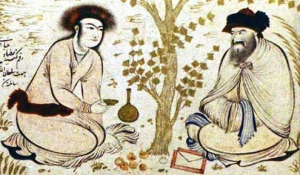Egypt, perhaps 6th century
{spell source}
These texts, dating from the first to the eleventh century, show a religious life quite different from that of the elite theologians who were writing at the same time. See for these texts - Marvin Meyer and Richard Smith, eds., Ancient Christian Magic: Coptic texts of Ritual Power, (San Francisco: HarperSanFrancisco, 1994)
One of the spells translated in this volume is for a man to obtain a male lover: evidence of a homosexual sub-culture, neither philosophic nor literary which we may believe existed at other times and places in the ancient world, but which has left little evidence.
. . .
This text contains a same-sex love spell commissioned by one Papalo to "bind" another man, Phello (this name literally means "the old man" or "the monk"), by means of a variety of powerful utterances (especially ROUS). Besides extending the scope of erotic binding spells in late antiquity, this spell also employs formulae common to several Coptic texts of ritual power.
+CELTATALBABAL [.]KARASHNEIFE[.]NNAS'KNEKIE, by the power of Yao Sabaoth, ROUS ROUS ROUS ROUS ROUS ROUS ROUS ROUS
(ring signs)
+++I adjure you by your powers and your amulets and
places where you dwell and your names, that just as I take you
a put you at the door and the pathway of Phello, son of Maure,
(so alos) you must take his heart and his mind; you must dominate
his entire body.
When he (tries to) stand, you must not allow him to stand
When he (tries to) sit, you must not allow him to sit
When he lies down to sleep, you must not allow him to sleep.
He must seek me from town to town, from city to city,
from field to filed, from region to region,
until he comes to me and subjects himself under my feet-
me, Papapolo son of Noe-
while his hand is full of all goodness,
until I satisfy with him the desire of my heart
and the demand of my soul,
with pleasant desire and love unending,
right now, right now, at once! Do my work
Notes:
The reference to "his hand full of all goodness" may be connected with the Hebrew use of "hand" for "penis".
{spell source}
These texts, dating from the first to the eleventh century, show a religious life quite different from that of the elite theologians who were writing at the same time. See for these texts - Marvin Meyer and Richard Smith, eds., Ancient Christian Magic: Coptic texts of Ritual Power, (San Francisco: HarperSanFrancisco, 1994)
One of the spells translated in this volume is for a man to obtain a male lover: evidence of a homosexual sub-culture, neither philosophic nor literary which we may believe existed at other times and places in the ancient world, but which has left little evidence.
. . .
This text contains a same-sex love spell commissioned by one Papalo to "bind" another man, Phello (this name literally means "the old man" or "the monk"), by means of a variety of powerful utterances (especially ROUS). Besides extending the scope of erotic binding spells in late antiquity, this spell also employs formulae common to several Coptic texts of ritual power.
+CELTATALBABAL [.]KARASHNEIFE[.]NNAS'KNEKIE, by the power of Yao Sabaoth, ROUS ROUS ROUS ROUS ROUS ROUS ROUS ROUS
(ring signs)
+++I adjure you by your powers and your amulets and
places where you dwell and your names, that just as I take you
a put you at the door and the pathway of Phello, son of Maure,
(so alos) you must take his heart and his mind; you must dominate
his entire body.
When he (tries to) stand, you must not allow him to stand
When he (tries to) sit, you must not allow him to sit
When he lies down to sleep, you must not allow him to sleep.
He must seek me from town to town, from city to city,
from field to filed, from region to region,
until he comes to me and subjects himself under my feet-
me, Papapolo son of Noe-
while his hand is full of all goodness,
until I satisfy with him the desire of my heart
and the demand of my soul,
with pleasant desire and love unending,
right now, right now, at once! Do my work
Notes:
The reference to "his hand full of all goodness" may be connected with the Hebrew use of "hand" for "penis".
